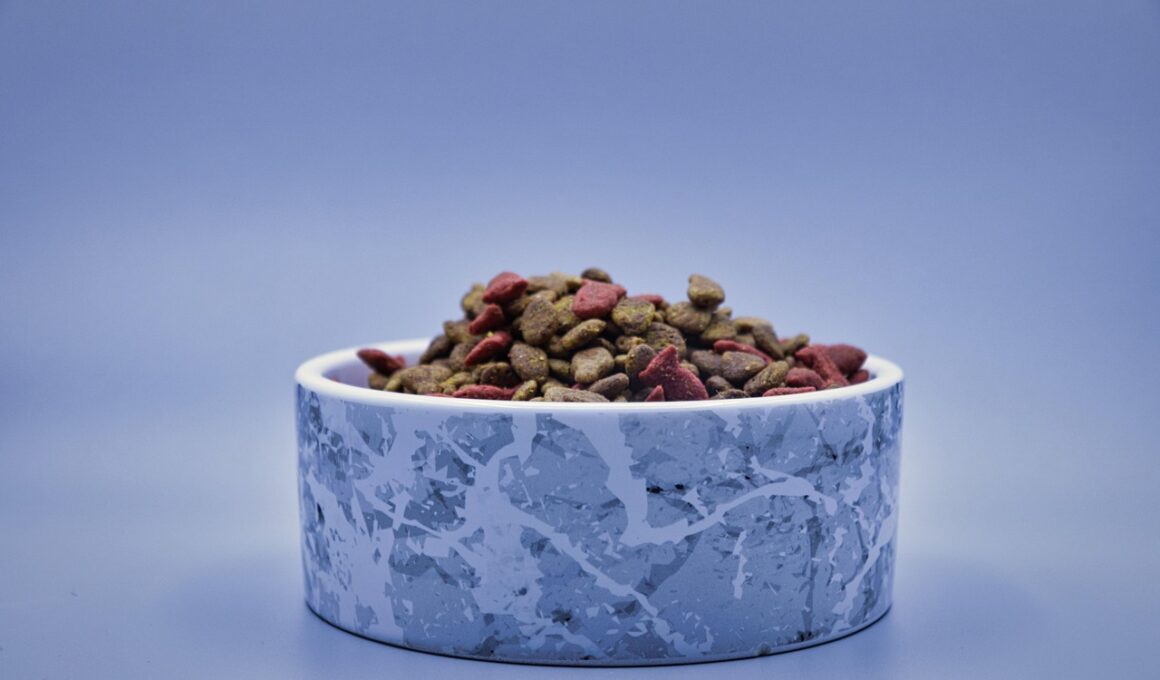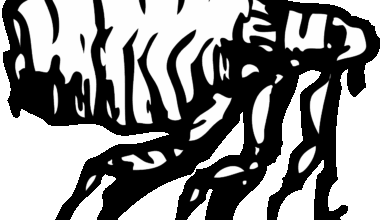The Connection Between Diet and Obsessive Behaviors in Cats
Understanding the connection between diet and obsessive behaviors in cats is essential for ensuring your feline’s mental well-being. Cats often exhibit obsessive behaviors, like excessive grooming or repetitive meowing, which can stem from various sources, including stress, boredom, and diet. Certain ingredients in cat food may contribute to these issues by not providing necessary nutrients for mental health. For instance, a diet low in essential fatty acids can lead to poor brain function, potentially translating into compulsive behaviors. It’s vital to assess the dietary habits of your cat, focusing on their specific nutritional needs, as deficiencies can manifest as anxiety or obsessive actions. If your cat is displaying such behaviors, consider conducting an ingredient review of their current food. Proper nutrition plays a significant role in overall health and behavior. Consider consulting with your veterinarian for tailored dietary advice that aligns with your pet’s specific needs. Offering enriched food options can also stimulate their senses, alleviating boredom-related compulsiveness. Therefore, managing their diet may be a key strategy in mitigating obsessive behaviors and enhancing your feline companion’s quality of life. Research supports this correlation, thereby urging owners to take proactive steps.
In addressing obsessive behaviors, it’s essential to know the role of protein in feline diets. Quality protein sources can significantly impact a cat’s behavior. Cats are obligate carnivores requiring protein to maintain cognitive functions and overall health. Diets that are higher in animal-based proteins promote satiety and nutritional balance, minimizing the chances of developing obsessive behaviors. Additionally, some formulations include amino acids like taurine, which aids in brain health. A lack of these nutrients might lead to increased tendencies toward repetitive actions, such as pacing or vocalizing excessively. Furthermore, palate preferences can determine a cat’s engagement with their food. Some finicky eaters might become stressed when their preferred food is unavailable. Stress is a significant factor in obsessive behaviors; thus, offering a variety of protein sources may boost appetite and reduce anxiety. Moreover, incorporating wet food can add hydration and stimulate interest. Always observe your cat’s behavior before and after dietary changes. Maintaining an open line of communication with your vet is essential to ensuring a balanced diet that meets your cat’s needs and mitigates potential obsessive tendencies due to dietary deficiencies.
Another important aspect to consider is the potential influence of carbohydrate content in cat food regarding obsessive behaviors. While cats require certain carbohydrates for energy, excessive amounts can lead to obesity and related health issues, manifesting in stress and compulsive behaviors. Cats naturally have low carbohydrate requirements since they primarily consume protein and fat in the wild. Diets disproportionately high in carbs can induce irritability and restlessness in some cats, thereby contributing to obsessive actions. It’s essential to choose products with balanced carbohydrate levels. Reading ingredient labels can help navigate your options, ensuring you select brands that prioritize high protein and minimal fillers. Products that include whole grains, vegetables, and fruits in moderation may provide beneficial nutrients without excessive calories. Moreover, gradual changes to a cat’s diet are key. Sudden switches may provoke stress and trigger compulsive behaviors. It’s advisable to introduce new foods slowly and observe changes in behavior or health. This method will promote a healthier relationship with food and enable optimal functioning. Collaborating with your veterinarian will also ensure that the chosen diet supports both physical and mental well-being to reduce the chances of developing obsessive tendencies.
The Role of Supplements
Supplements can play a beneficial role in the dietary strategies targeting obsessive behaviors in cats. Ingredients such as omega-3 fatty acids, probiotics, and specific vitamins can have direct effects on mood and behavior. Omega-3 fatty acids are known for their anti-inflammatory properties and can improve brain functioning, potentially reducing anxiety and compulsive tendencies. Similarly, probiotics can aid digestion and support overall health, which may indirectly influence behavior through gut health and nutrient absorption. Probiotic supplements foster a healthy gut microbiome, crucial for emotional stability in cats. Introducing these supplements should be done cautiously, always consulting with a vet first to avoid adverse reactions or interactions with existing medications. Additionally, products containing calming herbs, such as valerian or chamomile, may also be beneficial for an anxious cat. Making informed choices regarding supplements involves looking for quality products backed by research. Observing your cat after introducing any new supplement is vital to understanding how it affects their behavior. Therefore, integrating supplements into your cat’s diet may alleviate obsessive behaviors while empowering their overall health. Each cat may react differently, highlighting the importance of individually tailored approaches.
Environmental factors are also imperative in understanding cat behavior, particularly concerning obsessive actions. Cats demonstrate heightened behavior symptoms when exposed to stressors. A chaotic or restrictive environment can lead to nervousness and repetitive behaviors, and modifying such surroundings can prove beneficial. Creating a stimulating living space with cat trees, scratching posts, and interactive toys enables natural behaviors, helping reduce compulsive tendencies. Such setups can provide diversion and enrichment, which are crucial to feline mental health. Additionally, ensuring that basic needs are met, like access to litter boxes, food, and quiet resting areas, reduces stress. Communication with your veterinarian regarding behavioral assessments may also shed light on external stressors contributing to compulsive behaviors. Establishing a routine can further help with stability, as consistent feeding schedules prevent a sense of unpredictability. Consider cat-friendly spaces for hiding and retreating, which allow them to decompress during stressful encounters. Monitoring behavioral shifts following environmental changes is essential to gauge effectiveness. Enriching the environment is an essential part of fostering healthy mental behavior in cats. Tailoring the surroundings to fit your cat’s unique preferences and tendencies allows them the freedom to explore while minimizing anxiety.
Furthermore, the psychological well-being of your cat is just as significant. Mental stimulation is as necessary as proper nutrition for combating obsessive behaviors. Interactive feeding methods, such as puzzle toys or treat balls, can engage your cat’s intellect, stimulating problem-solving abilities and reducing boredom. Cats thrive when they have to work for their food, which mimics their natural hunting behaviors. Training and positive reinforcement can also contribute to mental engagement, encouraging new behaviors and reducing compulsivity through distractions. Regular play sessions using feather wands or laser pointers not only promote physical exercise but also foster a bond between cat and owner. These interactions are crucial, as emotional connections can alleviate stress and anxiety that lead to compulsive behaviors. Establishing predictable routines helps provide a sense of security, which is essential in reducing anxious behaviors. Observing your cat’s responses to various stimuli, whether it’s play or training, helps refine methods to keep your cat engaged. Mental stimulation is a vital strategy that falls often into the background of cat care but is equally important as physical health in managing obsessive behaviors.
Conclusion
In summary, the link between diet and obsessive behaviors in cats is significant and multifaceted. Proper nutrition is vital for promoting mental well-being. Providing balanced diets rich in protein, omega-3 fatty acids, and essential vitamins is crucial. Moreover, supplemental options and management of carbohydrate content can protect against developing stress-related compulsive behaviors. Addressing environmental factors, such as enhancing the cat’s surroundings and ensuring their psychological needs are met, plays a key role. Mental stimulation through play, interaction, and environmental enrichment is also essential to reduce compulsivity. Owners should work closely with a veterinarian to tailor dietary and environmental strategies addressing their cat’s individual needs. Observational adjustments and gradual implementation of changes can ensure lasting improvements in behavior. Owners must remain attentive to the correlation between what their cats eat and their mental state. Changing diet may not yield immediate results, but consistent efforts over time can make significant improvements. The journey toward healthier behaviors in cats hinges on proactive engagement with their dietary needs and overall well-being, creating a harmonious relationship between diet and behavior.


